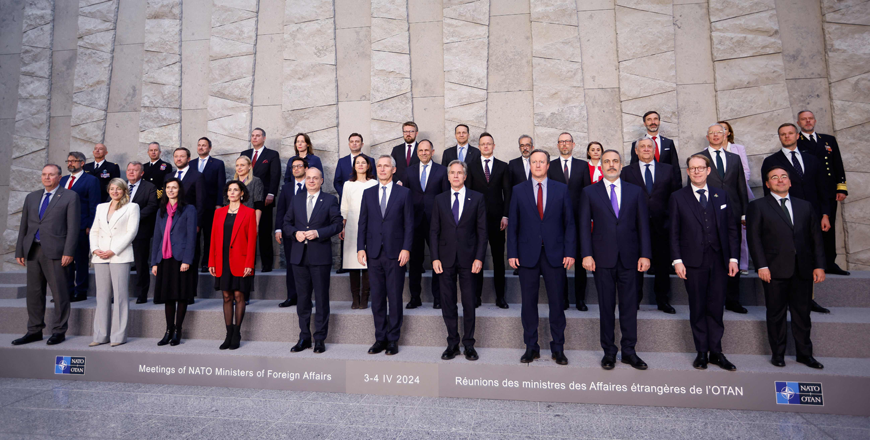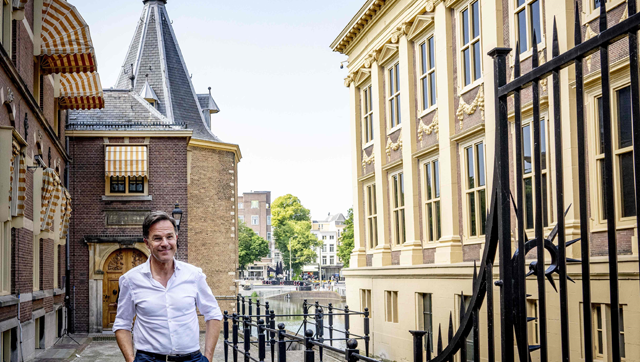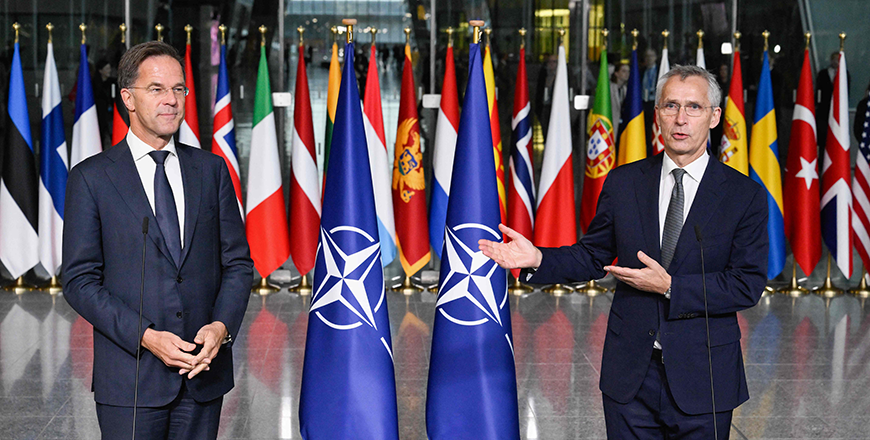You are here
NATO urged to ensure Ukraine arms flow as 100-b-euro fund floated
By AFP - Apr 04,2024 - Last updated at Apr 04,2024

Foreign Ministers pose for an official photograph with NATO Secretary General Jens Stoltenberg centre during the North Atlantic Council (NAC) Ministers of Foreign Affairs meeting at the NATO headquarters in Brussels on Wednesday (AFP photo)
BRUSSELS, Belgium — NATO foreign ministers on Wednesday debated the creation of a 100-billion-euro fund for Ukraine, as alliance chief Jens Stoltenberg urged them to guarantee long-term arms supplies for Kyiv's outgunned forces.
Stoltenberg pitched the five-year fund for Kyiv and a plan to deepen NATO's involvement in delivering weapons in a bid to shield support in the face of a potential return by Donald Trump to the US presidency.
The NATO secretary general said allies "agreed to move forward with planning for a greater NATO role in coordinating security assistance and training" with the view to reaching a deal by a summit in Washington in July.
"The details will take shape in the weeks to come. But make no mistake, Ukraine can rely on NATO support now and for the long haul," he said, after foreign ministers held talks in Brussels.
Despite a welcome for the proposed fund from staunch Ukraine allies such as Poland and the Baltic states there appeared to be considerable scepticism among other allies.
Germany’s Foreign Minister Annalena Baerbock backed setting up “long-term structures” to support Kyiv, but warned against “juggling in the air” vague figures.
Belgium’s top diplomat Hadja Lahbib insisted the proposal that envisions NATO members contributing according to the size of their economy was not “charity”.
“But it is dangerous to make promises that we cannot keep,” she said.
The second plank of Stoltenberg’s plan which appeared to get a warmer welcome envisions a NATO mission taking more control of coordinating arms supplies from a US-led grouping currently overseeing support.
The move would mark a major shift for the Western military alliance, which has so far refused as an organisation to send weapons to Ukraine for fear it would drag NATO closer to a conflict with Russia.
But Hungary — the friendliest country towards Russia in NATO — said it would not support any proposal that might “draw the alliance closer to war”.
Stoltenberg said he had tried to reach a compromise with Hungary’s Prime Minister Viktor Orban but diplomats said the right-wing populist had rebuffed a possible opt-out clause.
‘Vital that Ukraine wins’
Stoltenberg’s proposals came as Ukraine’s forces are struggling to hold back Russia in the face of dwindling supplies from Kyiv’s Western backers.
A $60-billion US funding package is currently stalled in Congress but there are hopes lawmakers could move to pass it in the coming weeks.
“The Ukrainians are not running out of courage. They’re running out of ammunition,” Stoltenberg said.
Ukraine’s Foreign Minister Dmytro Kuleba arrived in Brussels more focused on the short-term need for air defence in the face of a surge in Russian missile bombardments.
“Ukraine is currently the only country in the world that defends itself against ballistic missile attacks almost every day,” he wrote on the X social media platform after meeting his Polish counterpart.
“This means that all Patriot batteries available around the world that can be provided to Ukraine must be delivered to Ukraine as soon as possible. There is no more important place for them.”
The meeting in Brussels comes as NATO readies to mark on Thursday 75 years since it was founded in the wake of World War II to face off against the threat of the Soviet Union.
On the sidelines of the meeting, NATO foreign ministers were also expected to discuss the race to replace Stoltenberg, whose decade-long tenure ends in October.
The frontrunner to succeed him is Dutch premier Mark Rutte, though Romanian President Klaus Iohannis has launched a surprise challenge.
Diplomats said Rutte has the support of some 90 per cent of NATO countries, but Hungary and Turkey remain holdouts blocking a swift nomination ahead of the summit.
Related Articles
BRUSSELS, Belgium — NATO’s 32 nations on Wednesday appointed outgoing Dutch Prime Minister Mark Rutte as the alliance’s next chief, handing
BRUSSELS, Belgium — NATO head Jens Stoltenberg said on Thursday alliance members “are not providing Ukraine with enough ammunition” and the
BRUSSELS, BELGIUM — NATO's new chief Mark Rutte on Tuesday downplayed fears over the impact of a potential Donald Trump victory in upcoming
















